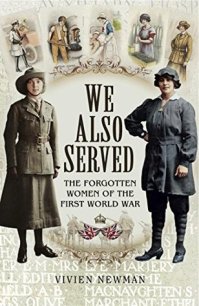The above is a quote from the Daily Sketch and appears on the back cover of We Also Served: The Forgotten Women of the First World War by Vivien Newman and, having just read the book, I echo the sentiment wholeheartedly. We Also Served is a gem. I was going to say ‘a gem for anyone interested in the role of women during the First World War, but that doesn’t do it justice. It is a gem. Full Stop.
As it happens, I have more than a pass ing interest in the subject and so already had a broad knowledge of the role of women during the Great War. Or so I thought. Newman doesn’t just consider the role of nurses or ambulance drivers or munition workers – she considers them all and many others besides. The sheer scope of research that has gone into this book is to be admired as Newman takes on the task of exploring women’s experience of war from August 4th 1914 right the way into the aftermath – and succeeds in telling a compelling story.
ing interest in the subject and so already had a broad knowledge of the role of women during the Great War. Or so I thought. Newman doesn’t just consider the role of nurses or ambulance drivers or munition workers – she considers them all and many others besides. The sheer scope of research that has gone into this book is to be admired as Newman takes on the task of exploring women’s experience of war from August 4th 1914 right the way into the aftermath – and succeeds in telling a compelling story.
At the beginning of the war, women were not expected to play any role other than to persuade their menfolk to join up while sitting quietly at home, patriotically knitting socks. As the war progressed, expectations changed and Britain needed her womenfolk in a way she never had before. Nursing was the most obvious support role for women at the time, both professionally and, increasingly, as volunteers. Unlike the men who volunteered for the army however, those women who volunteered as nurses were expected to purchase their own uniforms and pay their own expenses. Newman explores a whole breadth of nursing experiences from hospital trains, hospital ships and barges to Casualty Clearing Stations and Field Hospitals encompassing the stories of nurses from across the British Empire.
I think the thing that sets We Also Served apart from other similar books is the many and varied first hand accounts, diary entries and memoir extracts that are deftly women throughout the text. I was particularly gripped by the account of Dorothy Lawrence who, after a dozen unsuccessful attempts to undertake some form of voluntary work, decided to pack herself off to France as a war-correspondent. Investing £2 in a bicycle, Dorothy cycled her way into the proscribed zone, where no civilians were allowed to enter, before disguising herself as a Tommy (Sapper Dennis Smith) to make it all the way to the Front Line.
Then there was the indomitable Flora Sandes. An unconventional middle-class rebel, Flora was a young woman with a reputation for smoking, drinking and being a crack shot with a service revolver. Initially joining the Red Cross, Flora went on to join the Serbian Army – as a woman – where she fought shoulder to shoulder with her male comrades and was promoted through the ranks.
Other accounts that moved me were those of Gabrielle Petit and Lady May Bradford. Gabrielle Petit was a young Belgian shop assistant whose endeavours as a spy for the Allies resulted in her facing death by firing squad – a duty that some of the German soldiers involved simply could not discharge. Fulfilling a very different role, Lady May Bradford wrote letters home on behalf of the young men, maimed and dying in hospital beds. Lady May had a way with words and managed to write letters that honestly, but gently, broke the very worst of news to anxious wives and mothers at home, while also providing succour to the men who were unable to write for themselves. So important was her work that, in 1916, she was ‘Mentioned in Despatches’.
There are far too many stories for me to do justice to here – you really need to read We Also Served for yourself. You won’t be disappointed. Newman encompasses not just women’s experience of war, but the human experience of war. Her writing is intuitive, informative and always absorbing; this is a book I will return to again and again.
http://www.pen-and-sword.co.uk/We-Also-Served-Hardback/p/7883